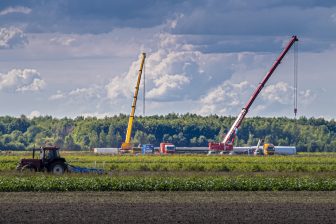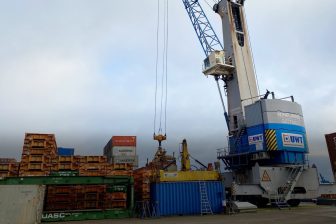EU policy responses to maritime transport challenges
Brussels, Belgium
Speech of Jacques Barrot Vice President of the European Commission in charge of Transport: EU policy responses to maritime transport challenges
In the study days of the EPP-ED Group in the European Parliament
Dear Ms. Thyssen,
Dear Messrs. Poettering, Daul, Jarzembowski,
Dear Minister Galea,
Ladies and Gentlemen,
I am most grateful to the Group of the European People’s Party and European Democrats for its kind invitation to participate in this discussion seminar.
My colleague, Joe Borg has just presented to you the whereabouts of the consultation process and outlined the possible follow-up by the Commission.
Transport policy will stand out very prominently in this exercise.
Integrated logistics are a key factor in our economic system. The EU Transport policy looks straight into the problems and opportunities created by the globalisation process. Sustainable economic growth requires all transport modes working together. This reduces external costs and, ultimately, avoids disruptions in our industrial, commercial and distribution structures.
It is because of the determining role of transport in economic growth that the authors of the Treaty of Rome made provision for a common transport policy with its own specific rules.
For today’s discussion, I would like to propose to you a few, basic reflexions about the critical maritime issues that Europe has to address from the wider context of the Transport policy.
I
In the first place, we have to be pretty aware of the congestion challenge that Europe and many other economies are facing today.
Supply chains, infrastructure networks, environmental standards and quality of life are suffering more and more from congestion.
The detailed assessment we did past year at the occasion of the mid-term review of the Transport White Paper shows quite clearly how the situation can develop in the horizon 2010-2015.
The strength of the EU economy and the continuous growth in trade largely confirm our assessment. We need to move urgently to ensure better use of existing infrastructures, further efficiency and integration of transport modes and efficient management of information. Above all, we need to shift away from old modal views isolating sea from land transport.
Just to give you a practical example: few weeks ago, at the occasion of the maritime conference organised by the German presidency, I had the opportunity to visit the port of Bremerhaven.
The port has become a key logistic centre ensuring the fluidity of merchandise flows at continental and inter-continental levels. People there are continuously monitoring processes that involve the smooth combination of ships, railways, and roads to supply European and world markets.
Operators in Bremerhaven were very clear about their concerns: there is a growing, urgent need for better use of technology and smarter use of combined logistics.
A similar plea is made by operators and transport experts all across Europe. Modern integrated logistics ensure the long term competitiveness of our industrial and commercial structures.
By no means can we allow ourselves to take a narrow single mode perspective and isolate shipping and port services from the whole logistics chain.
II
The second element that I wish to bring forward to your attention refers to the issues of energy efficiency and clean propulsion in shipping.
These issues, closely related to the climate change problem, are at the very core of our efforts to conceive, develop and implement a sustainable economic development strategy.
We have to be very clear here: as the situation stands today, maritime transport offers clear advantages in terms of atmospheric impacts.
Nevertheless, the potential for improvements in reduction of noxious emissions and in energy savings for ships and river barges are considerable. Some industry experts have pointed out recently that existing fleets need could reduce their energy use by at least 10%, perhaps by as much as 40% in the future, and technology has the answer.
Evidently, the answer is not through one solution, but through a combination of solutions and the industry should focus on all of them.
III
The third and last element that I propose for your reflexion today concerns the contribution of maritime transport to the objectives of the Lisbon agenda.
The importance of the maritime sector goes well beyond its dimension as a transport mode. Ships and ports are crucial for the strategic supply of energy and raw materials required by industries and our citizens.
Moreover, ships and ports are of essential importance for the generation of direct and indirect added value and for the creation of jobs in maritime related industries. Having European qualified personnel for our shipping is one of the major challenges we face.
We all have the interest to ensure that the European Union remains a world leader in shipping.
In the recent years, we have witnessed an impressive development in maritime transport activities, in all segments of the activity. European companies have invested heavily in the expansion and renewal of their fleets, be it ro-ro or container ships, oil tankers, bulk-carriers or cruise and passenger ships.
Our constant efforts on safety are bearing fruits and we can proudly say that, today, European shipping services are among the best, economically efficient and environmental performing shipping services in the world.
However, it would be a mistake to assume that the long term competitiveness of the sector is now ensured or that we can forget about maritime safety risks.
In today’s maritime world, good operators are still confronted with unfair competition from maritime nations and shipping operators that simply do not respect the rules of the game.
It is for that reason that we have to devote significant energy to pursuing action at international level with a twofold objective. The first one is to keep the world market open and ensure the stability of the international sea-borne trade system. The second one is to guarantee to our shipping operators a fair level playing field at world wide level.
In any case, the achievement of a sound regulatory environment at world-wide level is just a pre-requisite.
At the same time we have to be aware of the necessity of promoting maritime transport, better use of ports infrastructures and services, smarter use of logistics and intelligent systems and simplification and facilitation of trade and transport.
IV
Ladies and gentlemen,
In summary, the three elements that I have proposed for your consideration today are: integration of maritime in modern logistics, energy efficiency of shipping and competitiveness of European shipping and ports.
The Commission’s action plan announced last year with the mid-term review of the Transport Policy focuses precisely on those elements.
I will propose in the coming months a range of measures touching, inter alia, the development of short sea shipping and motorways of the sea, the performance of ports, the fluidity of sea-trade of intra-Community goods and the further integration of maritime and inland waterway modes in the overall transport chain.
Those measures will be presented, in October, under the form of a "logistic package", which will allow us to ensure consistence of approach and look into synergies benefiting all transport sectors and the EU economy as a whole.
Thank you very much for your attention.
Additional background information (provided by Infrasite’s Editorial Staff)
Dr Joe Borg: A Maritime Policy for the EU (2006-06-08)
U las zojuist één van de gratis premium artikelen
Onbeperkt lezen? Profiteer nu van de introductieaanbieding voor € 10,- per maand.
Bent u al abonnee?



